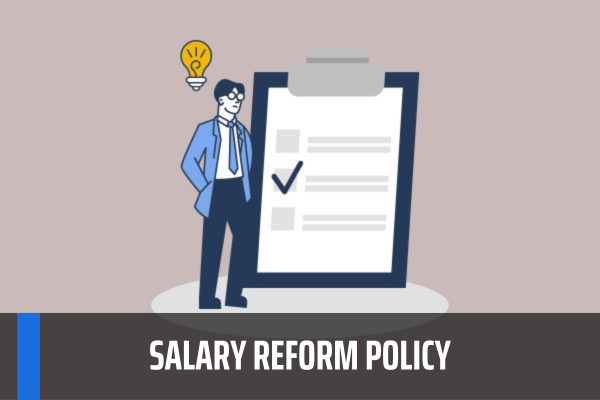What are the regulations on the salary reform policy for Vietnamese officials and public employees in 2024?
- What is the salary reform policy for Vietnamese officials and public employees in 2024?
- Will the current statutory pay rate and multiplier be annulled when reforming the salaries of Vietnamese officials and public employees?
- What is the expected rearrangement of the current allowance regime after the salary reform policy for Vietnamese officials and public employees?
What is the salary reform policy for Vietnamese officials and public employees in 2024?
According to Resolution 27-NQ/TW of 2018 on salary reform policy for officials and public employees, it is expected as follows:
- Annul the current statutory pay rate and multiplier, establish a base salary equal to a specific amount in the new salary table.
- Rearrange current allowance regimes, ensuring that the total allowance fund accounts for a maximum of 30% of the total salary budget.
- Develop the new salary structure for officials and public employees includes the following 3 income items:
Salary of officials, and public employees = Base pay (70% of total salary budget) + allowances (30% of salary budget). Additional bonus fund equal to about 10% of the year's total salary fund, excluding allowances.
- Develop and issue a new payroll system based on job position, title and leadership position to replace the current payroll system; Convert old salary to new salary, guaranteed not to be lower than current salary, including:
For officials and public employees holding leadership positions (elected and appointed) in the political system from central to commune level:
Develop a job-based salary table according to the following principles:
Job-based salaries must reflect hierarchy in the political system;
- Holding any leadership position will receive a salary according to that position. If a person holds many positions, he or she will receive the highest salary for the position;
- Holding equivalent leadership positions will receive the same salary; The position salary of a superior leader must be higher than the position salary of a subordinate leader;
Specify a salary level for each equivalent position;
- Do not classify ministries, branches, departments, committees and equivalents at the Central level when building the salary table for positions at the Central level;
- Do not differentiate between different salary levels for the same leadership position according to the classification of local administrative units, but do so through allowances.
The classification of equivalent leadership positions in the political system to design the position salary schedule is decided by the Politburo after reporting to the Central Executive Committee.
For officials and public employees who do not hold leadership positions:
Develop a professional and professional salary table according to official ranks and official professional titles, applicable generally to officials and public employees who do not hold leadership positions;
Each official rank and professional title has many salary levels according to the principle:
- Same job complexity level, same salary; Working conditions are higher than normal and job incentives are implemented through job-based allowances;
- Rearrange rank groups and number of ranks in official ranks and official professional titles, encourage officials and public employees to improve their professional qualifications and skills.
Appointment to official ranks or public employee professional titles must be linked to the job position and structure of official ranks and public employee professional titles by the agency, organization or unit managing officials and public employees.
Notably, the salary reform, converting the old salary to the new salary according to the principle of ensuring it is not lower than the current salary.

What are the regulations on the salary reform policy for Vietnamese officials and public employees in 2024?
Will the current statutory pay rate and multiplier be annulled when reforming the salaries of Vietnamese officials and public employees?
In section 3.1, subsection 3, Section 2 of Resolution 27-NQ/TW of 2018, 05 specific factors are identified to design the new salary schedule of officials and public employees as follows:
Reform content
3.1. For officials, public employees and armed forces (public sector)
...
c) Identify specific factors to design a new payroll
- Annul the current statutory pay rate and multiplier, establish a base salary equal to a specific amount in the new salary table.
- Uniformly implement the labor contract regime according to the provisions of the Labor Code (or service provision contracts) for those doing executive and serving jobs (requires training level below intermediate level), the salary schedule of officials and public employees is not applied to these subjects.
- Determine the lowest salary of officials and public employees in the public sector is the salary of people doing jobs requiring intermediate training level (level 1) which is not lower than the lowest salary of workers. through training in the business sector.
- Expand the salary relationship as a basis for determining specific salary levels in the payroll system, gradually approaching the salary relationship of the business sector in accordance with the State's resources.
- Complete the regime of regularly increasing salary levels and increasing salary levels ahead of schedule for officials, public employees and the armed forces in accordance with the regulations of the new salary table.
Thus, it is expected that when reforming the salaries of officials and public employees, the current statutory pay rate and multiplier will be annulled. Instead, the base pay will be established by a specific amount in the new salary schedule.
What is the expected rearrangement of the current allowance regime after the salary reform policy for Vietnamese officials and public employees?
According to Resolution 27-NQ/TW of 2018, the current allowance regime for officials and public employees when implementing the salary reform policy will be rearranged as follows:
Rearrange current allowance regimes, ensuring that the total allowance fund accounts for a maximum of 30% of the total salary budget
- Continue to apply part-time allowance; excess seniority allowance; regional allowances; work responsibility allowance; mobility allowance; Allowances for security, national defense and special allowances for the armed forces (army, police, cipher).
- Combine job-based preferential allowances, job-specific responsibility allowances and toxic and dangerous allowances (collectively referred to as job-based allowances) applicable to officials and public employees of occupations and jobs with Working conditions are higher than normal and there are appropriate preferential policies of the State (education and training, health care, courts, procuracy, civil judgment enforcement, inspection, examination, auditing, etc.) customs, forest rangers, market management,...).
Combine special allowances, attraction allowances and long-term work allowances in areas with particularly difficult socio-economic conditions into work allowances in especially difficult areas.
- Rejected
+ Professional seniority allowance (except military, police, and cipher to ensure salary correlation with officials and officials);
+ Leadership position allowances (due to leadership positions in the political system, position salaries are determined);
+ Allowances for party work and political and social organizations; civil service allowances (included in the base pay);
+ Toxic and dangerous allowances (because working conditions with toxic and dangerous elements have been included in occupational allowances).
- Supplement regulations on allowances according to administrative unit classification for commune, district and provincial levels.
- Consistently implement monthly allowance funds for part-time workers at the commune level, in villages and residential groups based on the regular expenditure rate of the Commune People's Committee;
At the same time, regulate the maximum number of part-time workers for each type of commune, village, and residential group level.
On that basis, the People's Committee at the commune level submits to the People's Council at the same level to specifically stipulate the titles eligible for allowances in the direction that one title can undertake many jobs but must ensure the quality and efficiency of work.
LawNet
